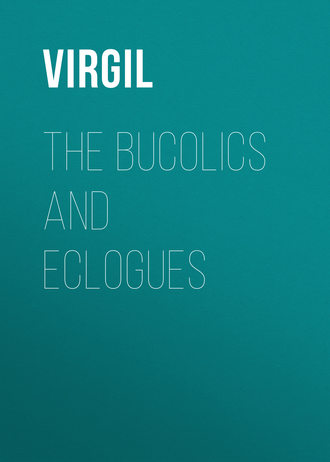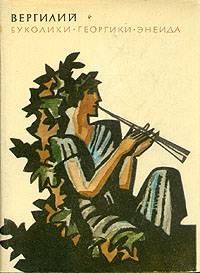The Bucolics and Eclogues
 полная версия
полная версияThe Bucolics and Eclogues
Жанр: зарубежная поэзиязарубежная классиказарубежная старинная литературастихи и поэзиясерьезное чтениеcтихи, поэзия
Язык: Английский
Год издания: 2018
Добавлена:
Настройки чтения
Размер шрифта
Высота строк
Поля
ECLOGUE VII
MELIBOEUS
CORYDON
THYRSIS
Daphnis beneath a rustling ilex-treeHad sat him down; Thyrsis and CorydonHad gathered in the flock, Thyrsis the sheep,And Corydon the she-goats swollen with milk-Both in the flower of age, Arcadians both,Ready to sing, and in like strain reply.Hither had strayed, while from the frost I fendMy tender myrtles, the he-goat himself,Lord of the flock; when Daphnis I espy!Soon as he saw me, "Hither haste," he cried,"O Meliboeus! goat and kids are safe;And, if you have an idle hour to spare,Rest here beneath the shade. Hither the steersWill through the meadows, of their own free will,Untended come to drink. Here Mincius hathWith tender rushes rimmed his verdant banks,And from yon sacred oak with busy humThe bees are swarming." What was I to do?No Phyllis or Alcippe left at homeHad I, to shelter my new-weaned lambs,And no slight matter was a singing-bout'Twixt Corydon and Thyrsis. Howsoe'er,I let my business wait upon their sport.So they began to sing, voice answering voiceIn strains alternate- for alternate strainsThe Muses then were minded to recall-First Corydon, then Thyrsis in reply.CORYDON"Libethrian Nymphs, who are my heart's delight,Grant me, as doth my Codrus, so to sing-Next to Apollo he- or if to thisWe may not all attain, my tuneful pipeHere on this sacred pine shall silent hang."THYRSIS"Arcadian shepherds, wreathe with ivy-sprayYour budding poet, so that Codrus burstWith envy: if he praise beyond my due,Then bind my brow with foxglove, lest his tongueWith evil omen blight the coming bard."CORYDON"This bristling boar's head, Delian Maid, to thee,With branching antlers of a sprightly stag,Young Micon offers: if his luck but hold,Full-length in polished marble, ankle-boundWith purple buskin, shall thy statue stand."THYRSIS"A bowl of milk, Priapus, and these cakes,Yearly, it is enough for thee to claim;Thou art the guardian of a poor man's plot.Wrought for a while in marble, if the flockAt lambing time be filled,stand there in gold."CORYDON"Daughter of Nereus, Galatea mine,Sweeter than Hybla-thyme, more white than swans,Fairer than ivy pale, soon as the steersShall from their pasture to the stalls repair,If aught for Corydon thou carest, come."THYRSIS"Now may I seem more bitter to your tasteThan herb Sardinian, rougher than the broom,More worthless than strewn sea-weed, if to-dayHath not a year out-lasted! Fie for shame!Go home, my cattle, from your grazing go!"CORYDON"Ye mossy springs, and grass more soft than sleep,And arbute green with thin shade sheltering you,Ward off the solstice from my flock, for nowComes on the burning summer, now the budsUpon the limber vine-shoot 'gin to swell."THYRSIS"Here is a hearth, and resinous logs, here fireUnstinted, and doors black with ceaseless smoke.Here heed we Boreas' icy breath as muchAs the wolf heeds the number of the flock,Or furious rivers their restraining banks."CORYDON"The junipers and prickly chestnuts stand,And 'neath each tree lie strewn their several fruits,Now the whole world is smiling, but if fairAlexis from these hill-slopes should away,Even the rivers you would ; see run dry."THYRSIS"The field is parched, the grass-blades thirst to deathIn the faint air; Liber hath grudged the hillsHis vine's o'er-shadowing: should my Phyllis come,Green will be all the grove, and JupiterDescend in floods of fertilizing rain."CORYDON"The poplar doth Alcides hold most dear,The vine Iacchus, Phoebus his own bays,And Venus fair the myrtle: therewithalPhyllis doth hazels love, and while she loves,Myrtle nor bay the hazel shall out-vie."THYRSIS"Ash in the forest is most beautiful,Pine in the garden, poplar by the stream,Fir on the mountain-height; but if more oftThou'ldst come to me, fair Lycidas, to theeBoth forest-ash, and garden-pine should bow."MELIBOEUSThese I remember, and how Thyrsis stroveFor victory in vain. From that time forthIs Corydon still Corydon with us.ECLOGUE VIII
TO POLLIO
DAMON
ALPHESIBOEUS
Of Damon and Alphesiboeus now,Those shepherd-singers at whose rival strainsThe heifer wondering forgot to graze,The lynx stood awe-struck, and the flowing streams,Unwonted loiterers, stayed their course to hear-How Damon and Alphesiboeus sangTheir pastoral ditties, will I tell the tale.Thou, whether broad Timavus' rocky banksThou now art passing, or dost skirt the shoreOf the Illyrian main,– will ever dawnThat day when I thy deeds may celebrate,Ever that day when through the whole wide worldI may renown thy verse- that verse aloneOf Sophoclean buskin worthy found?With thee began, to thee shall end, the strain.Take thou these songs that owe their birth to thee,And deign around thy temples to let creepThis ivy-chaplet 'twixt the conquering bays.Scarce had night's chilly shade forsook the skyWhat time to nibbling sheep the dewy grassTastes sweetest, when, on his smooth shepherd-staffOf olive leaning, Damon thus began.DAMON"Rise, Lucifer, and, heralding the light,Bring in the genial day, while I make moanFooled by vain passion for a faithless bride,For Nysa, and with this my dying breathCall on the gods, though little it bestead-The gods who heard her vows and heeded not."Begin, my flute, with me Maenalian lays.Ever hath Maenalus his murmuring grovesAnd whispering pines, and ever hears the songsOf love-lorn shepherds, and of Pan, who firstBrooked not the tuneful reed should idle lie."Begin, my flute, with me Maenalian lays.Nysa to Mopsus given! what may not thenWe lovers look for? soon shall we see mateGriffins with mares, and in the coming ageShy deer and hounds together come to drink."Begin, my flute, with me Maenalian lays.Now, Mopsus, cut new torches, for they bringYour bride along; now, bridegroom, scatter nuts:Forsaking Oeta mounts the evening star!"Begin, my flute, with me Maenalian lays.O worthy of thy mate, while all men elseThou scornest, and with loathing dost beholdMy shepherd's pipe, my goats, my shaggy brow,And untrimmed beard, nor deem'st that any godFor mortal doings hath regard or care."Begin, my flute, with me Maenalian lays.Once with your mother, in our orchard-garth,A little maid I saw you- I your guide-Plucking the dewy apples. My twelfth yearI scarce had entered, and could barely reachThe brittle boughs. I looked, and I was lost;A sudden frenzy swept my wits away."Begin, my flute, with me Maenalian lays.Now know I what Love is: 'mid savage rocksTmaros or Rhodope brought forth the boy,Or Garamantes in earth's utmost bounds-No kin of ours, nor of our blood begot."Begin, my flute, with me Maenalian lays.Fierce Love it was once steeled a mother's heartWith her own offspring's blood her hands to imbrue:Mother, thou too wert cruel; say wert thouMore cruel, mother, or more ruthless he?Ruthless the boy, thou, mother, cruel too."Begin, my flute, with me Maenalian lays.Now let the wolf turn tail and fly the sheep,Tough oaks bear golden apples, alder-treesBloom with narcissus-flower, the tamariskSweat with rich amber, and the screech-owl vieIn singing with the swan: let TityrusBe Orpheus, Orpheus in the forest-glade,Arion 'mid his dolphins on the deep."Begin, my flute, with me Maenalian lays.Yea, be the whole earth to mid-ocean turned!Farewell, ye woodlands I from the tall peakOf yon aerial rock will headlong plungeInto the billows: this my latest gift,From dying lips bequeathed thee, see thou keep.Cease now, my flute, now cease Maenalian lays."Thus Damon: but do ye, Pierian Maids-We cannot all do all things- tell me howAlphesiboeus to his strain replied.ALPHESIBOEUS"Bring water, and with soft wool-fillet bindThese altars round about, and burn thereonRich vervain and male frankincense, that IMay strive with magic spells to turn astrayMy lover's saner senses, whereuntoThere lacketh nothing save the power of song."Draw from the town, my songs, draw Daphnis home.Songs can the very moon draw down from heavenCirce with singing changed from human formThe comrades of Ulysses, and by songIs the cold meadow-snake, asunder burst."Draw from the town, my songs, draw Daphnis home.These triple threads of threefold colour firstI twine about thee, and three times withalAround these altars do thine image bear:Uneven numbers are the god's delight."Draw from the town, my songs, draw Daphnis home.Now, Amaryllis, ply in triple knotsThe threefold colours; ply them fast, and sayThis is the chain of Venus that I ply."Draw from the town, my songs, draw Daphnis home.As by the kindling of the self-same fireHarder this clay, this wax the softer grows,So by my love may Daphnis; sprinkle meal,And with bitumen burn the brittle bays.Me Daphnis with his cruelty doth burn,I to melt cruel Daphnis burn this bay."Draw from the town, my songs, draw Daphnis home.As when some heifer, seeking for her steerThrough woodland and deep grove, sinks wearied outOn the green sedge beside a stream, love-lorn,Nor marks the gathering night that calls her home-As pines that heifer, with such love as hersMay Daphnis pine, and I not care to heal."Draw from the town, my songs, draw Daphnis home.These relics once, dear pledges of himself,The traitor left me, which, O earth, to theeHere on this very threshold I commit-Pledges that bind him to redeem the debt."Draw from the town, my songs, draw Daphnis home.These herbs of bane to me did Moeris give,In Pontus culled, where baneful herbs abound.With these full oft have I seen Moeris changeTo a wolf's form, and hide him in the woods,Oft summon spirits from the tomb's recess,And to new fields transport the standing corn."Draw from the town, my songs, draw Daphnis home.Take ashes, Amaryllis, fetch them forth,And o'er your head into the running brookFling them, nor look behind: with these willUpon the heart of Daphnis make essay.Nothing for gods, nothing for songs cares he."Draw from the town, my songs, draw Daphnis home.Look, look I the very embers of themselvesHave caught the altar with a flickering flame,While I delay to fetch them: may the signProve lucky! something it must mean, for sure,And Hylax on the threshold 'gins to bark!May we believe it, or are lovers stillBy their own fancies fooled?Give o'er, my songs,Daphnis is coming from the town, give o'er."ECLOGUE IX
LYCIDAS
MOERIS
LYCIDASSay whither, Moeris?– Make you for the town,Or on what errand bent?MOERISO Lycidas,We have lived to see, what never yet we feared,An interloper own our little farm,And say, "Be off, you former husbandmen!These fields are mine." Now, cowed and out of heart,Since Fortune turns the whole world upside down,We are taking him- ill luck go with the same!-'These kids you see.LYCIDASBut surely I had heardThat where the hills first draw from off the plain,And the high ridge with gentle slope descends,Down to the brook-side and the broken crestsOf yonder veteran beeches, all the landWas by the songs of your Menalcas saved.MOERISHeard it you had, and so the rumour ran,But 'mid the clash of arms, my Lycidas,Our songs avail no more than, as 'tis said,Doves of Dodona when an eagle comes.Nay, had I not, from hollow ilex-boleWarned by a raven on the left, cut shortThe rising feud, nor I, your Moeris here,No, nor Menalcas, were alive to-day.LYCIDASAlack! could any of so foul a crimeBe guilty? Ah! how nearly, thyself,Reft was the solace that we had in thee,Menalcas! Who then of the Nymphs had sung,Or who with flowering herbs bestrewn the ground,And o'er the fountains drawn a leafy veil?-Who sung the stave I filched from you that dayTo Amaryllis wending, our hearts' joy?-"While I am gone, 'tis but a little way,Feed, Tityrus, my goats, and, having fed,Drive to the drinking-pool, and, as you drive,Beware the he-goat; with his horn he butts."MOERISAy, or to Varus that half-finished lay,"Varus, thy name, so still our Mantua live-Mantua to poor Cremona all too near-Shall singing swans bear upward to the stars."LYCIDASSo may your swarms Cyrnean yew-trees shun,Your kine with cytisus their udders swell,Begin, if aught you have. The Muses madeMe too a singer; I too have sung; the swainsCall me a poet, but I believe them not:For naught of mine, or worthy Varius yetOr Cinna deem I, but account myselfA cackling goose among melodious swans.MOERIS'Twas in my thought to do so, Lycidas;Even now was I revolving silentlyIf this I could recall- no paltry song:"Come, Galatea, what pleasure is 't to playAmid the waves? Here glows the Spring, here earthBeside the streams pours forth a thousand flowers;Here the white poplar bends above the cave,And the lithe vine weaves shadowy covert: come,Leave the mad waves to beat upon the shore."LYCIDASWhat of the strain I heard you singing onceOn a clear night alone? the notes I stillRemember, could I but recall the words.MOERIS"Why, Daphnis, upward gazing, do you markThe ancient risings of the Signs? for lookWhere Dionean Caesar's star comes forthIn heaven, to gladden all the fields with corn,And to the grape upon the sunny slopesHer colour bring! Now, the pears;So shall your children's children pluck their fruit.Time carries all things, even our wits, away.Oft, as a boy, I sang the sun to rest,But all those songs are from my memory fled,And even his voice is failing Moeris now;The wolves eyed Moeris first: but at your wishMenalcas will repeat them oft enow.LYCIDASYour pleas but linger out my heart's desire:Now all the deep is into silence hushed,And all the murmuring breezes sunk to sleep.We are half-way thither, for Bianor's tombBegins to show: here, Moeris, where the hindsAre lopping the thick leafage, let us sing.Set down the kids, yet shall we reach the town;Or, if we fear the night may gather rainEre we arrive, then singing let us go,Our way to lighten; and, that we may thusGo singing, I will case you of this load.MOERISCease, boy, and get we to the work in hand:We shall sing better when himself is come.ECLOGUE X
GALLUS
This now, the very latest of my toils,Vouchsafe me, Arethusa! needs must ISing a brief song to Gallus- brief, but yetSuch as Lycoris' self may fitly read.Who would not sing for Gallus? So, when thouBeneath Sicanian billows glidest on,May Doris blend no bitter wave with thine,Begin! The love of Gallus be our theme,And the shrewd pangs he suffered, while, hard by,The flat-nosed she-goats browse the tender brush.We sing not to deaf ears; no word of oursBut the woods echo it. What groves or lawnsHeld you, ye Dryad-maidens, when for love-Love all unworthy of a loss so dear-Gallus lay dying? for neither did the slopesOf Pindus or Parnassus stay you then,No, nor Aonian Aganippe. HimEven the laurels and the tamarisks wept;For him, outstretched beneath a lonely rock,Wept pine-clad Maenalus, and the flinty cragsOf cold Lycaeus. The sheep too stood around-Of us they feel no shame, poet divine;Nor of the flock be thou ashamed: even fairAdonis by the rivers fed his sheep-Came shepherd too, and swine-herd footing slow,And, from the winter-acorns dripping-wetMenalcas. All with one accord exclaim:"From whence this love of thine?" Apollo came;"Gallus, art mad?" he cried, "thy bosom's careAnother love is following."TherewithalSilvanus came, with rural honours crowned;The flowering fennels and tall lilies shookBefore him. Yea, and our own eyes beheldPan, god of Arcady, with blood-red juiceOf the elder-berry, and with vermilion, dyed."Wilt ever make an end?" quoth he, "beholdLove recks not aught of it: his heart no moreWith tears is sated than with streams the grass,Bees with the cytisus, or goats with leaves.""Yet will ye sing, Arcadians, of my woesUpon your mountains," sadly he replied-"Arcadians, that alone have skill to sing.O then how softly would my ashes rest,If of my love, one day, your flutes should tell!And would that I, of your own fellowship,Or dresser of the ripening grape had been,Or guardian of the flock! for surely then,Let Phyllis, or Amyntas, or who else,Bewitch me- what if swart Amyntas be?Dark is the violet, dark the hyacinth-Among the willows, 'neath the limber vine,Reclining would my love have lain with me,Phyllis plucked garlands, or Amyntas sung.Here are cool springs, soft mead and grove, Lycoris;Here might our lives with time have worn away.But me mad love of the stern war-god holdsArmed amid weapons and opposing foes.Whilst thou- Ah! might I but believe it not!-Alone without me, and from home afar,Look'st upon Alpine snows and frozen Rhine.Ah! may the frost not hurt thee, may the sharpAnd jagged ice not wound thy tender feet!I will depart, re-tune the songs I framedIn verse Chalcidian to the oaten reedOf the Sicilian swain. Resolved am IIn the woods, rather, with wild beasts to couch,And bear my doom, and character my loveUpon the tender tree-trunks: they will grow,And you, my love, grow with them. And meanwhileI with the Nymphs will haunt Mount Maenalus,Or hunt the keen wild boar. No frost so coldBut I will hem with hounds thy forest-glades,Parthenius. Even now, methinks, I rangeO'er rocks, through echoing groves, and joy to launchCydonian arrows from a Parthian bow.-As if my madness could find healing thus,Or that god soften at a mortal's grief!Now neither Hamadryads, no, nor songsDelight me more: ye woods, away with you!No pangs of ours can change him; not though weIn the mid-frost should drink of Hebrus' stream,And in wet winters face Sithonian snows,Or, when the bark of the tall elm-tree boleOf drought is dying, should, under Cancer's Sign,In Aethiopian deserts drive our flocks.Love conquers all things; yield we too to love!"These songs, Pierian Maids, shall it sufficeYour poet to have sung, the while he sat,And of slim mallow wove a basket fine:To Gallus ye will magnify their worth,Gallus, for whom my love grows hour by hour,As the green alder shoots in early Spring.Come, let us rise: the shade is wont to beBaneful to singers; baneful is the shadeCast by the juniper, crops sicken tooIn shade. Now homeward, having fed your fill–Eve's star is rising-go, my she-goats, go.







